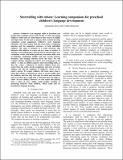| dc.contributor.author | Breazeal, Cynthia Lynn | |
| dc.contributor.author | Kory Westlund, Jacqueline Marie | |
| dc.date.accessioned | 2016-08-25T15:15:13Z | |
| dc.date.available | 2016-08-25T15:15:13Z | |
| dc.date.issued | 2014-08 | |
| dc.identifier.isbn | 978-1-4799-6765-0 | |
| dc.identifier.isbn | 978-1-4799-6763-6 | |
| dc.identifier.issn | 1944-9445 | |
| dc.identifier.issn | 1944-9437 | |
| dc.identifier.other | INSPEC Accession Number: 14695022 | |
| dc.identifier.uri | http://hdl.handle.net/1721.1/103976 | |
| dc.description.abstract | Children's oral language skills in preschool can predict their academic success later in life. As such, increasing children's skills early on could improve their success in middle and high school. To this end, we propose that a robotic learning companion could supplement children's early language education. The robot targets both the social nature of language learning and the adaptation necessary to help individual children. The robot is designed as a social character that interacts with children as a peer, not as a tutor or teacher. It will play a storytelling game, during which it will introduce new vocabulary words, and model good story narration skills, such as including a beginning, middle, and end; varying sentence structure; and keeping cohesion across the story. We will evaluate whether adapting the robot's level of language to the child's - so that, as children improve their storytelling skills, so does the robot - influences (i) whether children learn new words from the robot, (ii) the complexity and style of stories children tell, (iii) the similarity of children's stories to the robot's stories. We expect children will learn more from a robot that adapts to maintain an equal or greater ability than the children, and that they will copy its stories and narration style more than they would with a robot that does not adapt (a robot of lesser ability). However, we also expect that playing with a robot of lesser ability could prompt teaching or mentoring behavior from children, which could also be beneficial to language learning. | en_US |
| dc.description.sponsorship | National Science Foundation (U.S.) (NSF Grant 122886) | en_US |
| dc.description.sponsorship | National Science Foundation (U.S.) (NSF Grant CCF-1138986) | en_US |
| dc.description.sponsorship | National Science Foundation (U.S.) (NSF Graduate Research Fellowship, grant number 1122374) | en_US |
| dc.language.iso | en_US | |
| dc.publisher | Institute of Electrical and Electronics Engineers (IEEE) | en_US |
| dc.relation.isversionof | http://dx.doi.org/10.1109/ROMAN.2014.6926325 | en_US |
| dc.rights | Creative Commons Attribution-Noncommercial-Share Alike | en_US |
| dc.rights.uri | http://creativecommons.org/licenses/by-nc-sa/4.0/ | en_US |
| dc.source | MIT web domain | en_US |
| dc.title | Storytelling with robots: Learning companions for preschool children's language development | en_US |
| dc.type | Article | en_US |
| dc.identifier.citation | Kory, Jacqueline, and Cynthia Breazeal. “Storytelling with Robots: Learning Companions for Preschool Children’s Language Development.” The 23rd IEEE International Symposium on Robot and Human Interactive Communication, 2014 IEEE RO-MAN (August 25-29, 2014). | en_US |
| dc.contributor.department | Massachusetts Institute of Technology. Media Laboratory | en_US |
| dc.contributor.department | Program in Media Arts and Sciences (Massachusetts Institute of Technology) | en_US |
| dc.contributor.mitauthor | Kory, Jacqueline Marie | en_US |
| dc.contributor.mitauthor | Breazeal, Cynthia Lynn | en_US |
| dc.relation.journal | Proceedings of the 23rd IEEE International Symposium on Robot and Human Interactive Communication | en_US |
| dc.eprint.version | Author's final manuscript | en_US |
| dc.type.uri | http://purl.org/eprint/type/ConferencePaper | en_US |
| eprint.status | http://purl.org/eprint/status/NonPeerReviewed | en_US |
| dspace.embargo.terms | N | en_US |
| dc.identifier.orcid | https://orcid.org/0000-0002-0587-2065 | |
| dc.identifier.orcid | https://orcid.org/0000-0002-0418-4674 | |
| mit.license | OPEN_ACCESS_POLICY | en_US |
